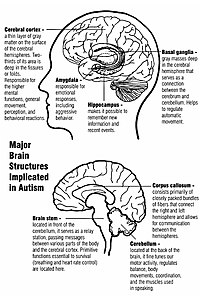
Photo from wikipedia
The pathogenesis of cerebral ischemia–reperfusion (I/R) injury is complex and does not exhibit an effective strategy. Maternal inflammation represents one of the most important factors involved in the etiology of… Click to show full abstract
The pathogenesis of cerebral ischemia–reperfusion (I/R) injury is complex and does not exhibit an effective strategy. Maternal inflammation represents one of the most important factors involved in the etiology of brain injury in newborns. We aimed to investigate the effect of maternal inflammation on offspring susceptibility to cerebral I/R injury and the mechanisms by which it exerts its effects. Pregnant SD rats were intraperitoneally injected with LPS (300 μg/kg/day) at gestational days 11, 14, and 18. Pups were subjected to MCAO/R on postnatal day 60. Primary neurons were obtained from postnatal day 0 SD rats and subjected to OGD/R. Neurological deficits, brain injury, neuronal viability, neuronal damage, and neuronal apoptosis were assessed. Oxidative stress and inflammation were evaluated, and the expression levels of COX-2/PGD2/DP pathway-related proteins and apoptotic proteins were detected. Maternal LPS exposure significantly increased the levels of oxidative stress and inflammation, significantly activated the COX-2/PGD2/DP2 pathway, and increased proapoptotic protein expression. However, maternal LPS exposure significantly decreased the antiapoptotic protein expression, which subsequently increased neurological deficits and cerebral I/R injury in offspring rats. The corresponding results were observed in primary neurons. Moreover, these effects of maternal LPS exposure were reversed by a COX-2 inhibitor and DP1 agonist but exacerbated by a DP2 agonist. In conclusion, maternal inflammatory exposure may increase offspring susceptibility to cerebral I/R injury. Moreover, the underlying mechanism might be related to the activation of the COX-2/PGD2/DP2 pathway. These findings provide a theoretical foundation for the development of therapeutic drugs for cerebral I/R injury.
Journal Title: Oxidative Medicine and Cellular Longevity
Year Published: 2022
Link to full text (if available)
Share on Social Media: Sign Up to like & get
recommendations!